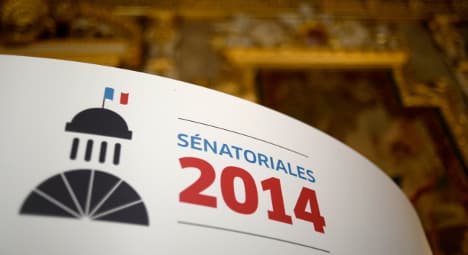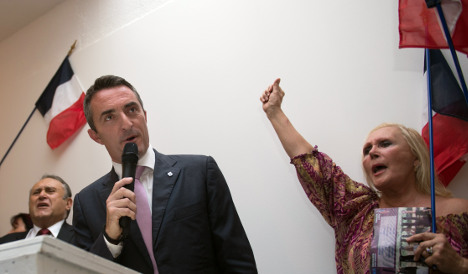French Socialists lose control of the Senate

There was more election misery for François Hollande and his Socialist party on Sunday when the left lost control of the Senate. And there was more evidence of the growing influence of the far-right National Front party, which won seats for the first time.
Three years after France's upper house Senate made its first ever swing to the left, the right has clawed back a majority, with the far-right National Front winning seats for the first time.
The results were a new setback for beleaguered Socialist President Francois Hollande.
The conservative UMP party of Hollande's predecessor Nicolas Sarkozy and its allies from the centrist UDI won 188 seats according to near-final results in the late evening - 13 seats more than needed for an absolute majority.
The far-right National Front (FN), meanwhile, entered the senate for the first time, securing two seats in what its leader Marine Le Pen described as a "historic victory".
"It's the first time that we are entering the Senate and in a nice way, with two senators," she said.
Stephane Ravier, one of the successful FN candidates, reflected the party's upbeat mood, saying: "Now there is only one more door to push open, that of the Elysee (presidential palace)."
The fortunes of the FN have been on the ascendant this year with the anti-immigration eurosceptic party gaining electoral ground in municipal elections and topping the European Parliament vote in May.
An opinion poll this month showed that FN leader Le Pen would beat Hollande in presidential elections in 2017 in the event of a second round run-off between them.

(Stephane Ravier one of the two National Front candidates to win Senate seats. Photo: AFP)
The Senate elections saw more than 87,500 regional and local elected officials nationwide vote for their preferred candidate, six months after the Socialists suffered a drubbing in municipal polls that saw the right make significant gains.
France's upper house is not chosen by universal suffrage but by a "super-electorate" of elected representatives who vote to renew roughly half of the 348-seat Senate every three years.
Tables turning again
A new Senate leader will be chosen on Wednesday from the UMP ranks, to succeed socialist Jean-Pierre Bel.
Former prime minister Jean-Pierre Raffarin is among the front runners.
While the Senate does not wield as much influence as the lower house National Assembly - which has the final say on voting bills through - a swing to the right comes as another blow for Hollande, the most unpopular president in modern French history.
His Socialist government has struggled to contain an economic crisis in France, where zero-growth, sky-high unemployment, a bulging deficit and heavy
taxes are taking their toll.
Plans to redraw the map of France, cutting the number of regions from 22 to 13, have also proven controversial.
And an explosive kiss-and-tell by Hollande's former partner Valerie Trierweiler painting him as a power-crazed leader who secretly despises the poor has done nothing to boost his image.
Right-wing parties had controlled the Senate since the Fifth Republic was founded in 1958. But in 2011, the upper house flipped to the left in a historic move that planted the seeds for then-president Sarkozy's eventual defeat to Hollande in 2012 presidential elections.
"Nicolas Sarkozy will go down in history as the president who lost the right its majority in the Senate," Hollande declared at the time.
Three years on, the tables are turning again.
Sarkozy has returned to politics with a bid to stand for the presidency of the centre-right UMP opposition party and, while he has not overtly declared he is eyeing the 2017 presidential election, there is little doubt it is his end-game.
The Socialists had already suffered a drubbing in local and European elections this year and the government has been through two cabinet reshuffles as it tries to battle the political and economic crises.
Comments
See Also
Three years after France's upper house Senate made its first ever swing to the left, the right has clawed back a majority, with the far-right National Front winning seats for the first time.
The results were a new setback for beleaguered Socialist President Francois Hollande.
The conservative UMP party of Hollande's predecessor Nicolas Sarkozy and its allies from the centrist UDI won 188 seats according to near-final results in the late evening - 13 seats more than needed for an absolute majority.
The far-right National Front (FN), meanwhile, entered the senate for the first time, securing two seats in what its leader Marine Le Pen described as a "historic victory".
"It's the first time that we are entering the Senate and in a nice way, with two senators," she said.
Stephane Ravier, one of the successful FN candidates, reflected the party's upbeat mood, saying: "Now there is only one more door to push open, that of the Elysee (presidential palace)."
The fortunes of the FN have been on the ascendant this year with the anti-immigration eurosceptic party gaining electoral ground in municipal elections and topping the European Parliament vote in May.
An opinion poll this month showed that FN leader Le Pen would beat Hollande in presidential elections in 2017 in the event of a second round run-off between them.

(Stephane Ravier one of the two National Front candidates to win Senate seats. Photo: AFP)
The Senate elections saw more than 87,500 regional and local elected officials nationwide vote for their preferred candidate, six months after the Socialists suffered a drubbing in municipal polls that saw the right make significant gains.
France's upper house is not chosen by universal suffrage but by a "super-electorate" of elected representatives who vote to renew roughly half of the 348-seat Senate every three years.
Tables turning again
A new Senate leader will be chosen on Wednesday from the UMP ranks, to succeed socialist Jean-Pierre Bel.
Former prime minister Jean-Pierre Raffarin is among the front runners.
While the Senate does not wield as much influence as the lower house National Assembly - which has the final say on voting bills through - a swing to the right comes as another blow for Hollande, the most unpopular president in modern French history.
His Socialist government has struggled to contain an economic crisis in France, where zero-growth, sky-high unemployment, a bulging deficit and heavy
taxes are taking their toll.
Plans to redraw the map of France, cutting the number of regions from 22 to 13, have also proven controversial.
And an explosive kiss-and-tell by Hollande's former partner Valerie Trierweiler painting him as a power-crazed leader who secretly despises the poor has done nothing to boost his image.
Right-wing parties had controlled the Senate since the Fifth Republic was founded in 1958. But in 2011, the upper house flipped to the left in a historic move that planted the seeds for then-president Sarkozy's eventual defeat to Hollande in 2012 presidential elections.
"Nicolas Sarkozy will go down in history as the president who lost the right its majority in the Senate," Hollande declared at the time.
Three years on, the tables are turning again.
Sarkozy has returned to politics with a bid to stand for the presidency of the centre-right UMP opposition party and, while he has not overtly declared he is eyeing the 2017 presidential election, there is little doubt it is his end-game.
The Socialists had already suffered a drubbing in local and European elections this year and the government has been through two cabinet reshuffles as it tries to battle the political and economic crises.
Join the conversation in our comments section below. Share your own views and experience and if you have a question or suggestion for our journalists then email us at [email protected].
Please keep comments civil, constructive and on topic – and make sure to read our terms of use before getting involved.
Please log in here to leave a comment.